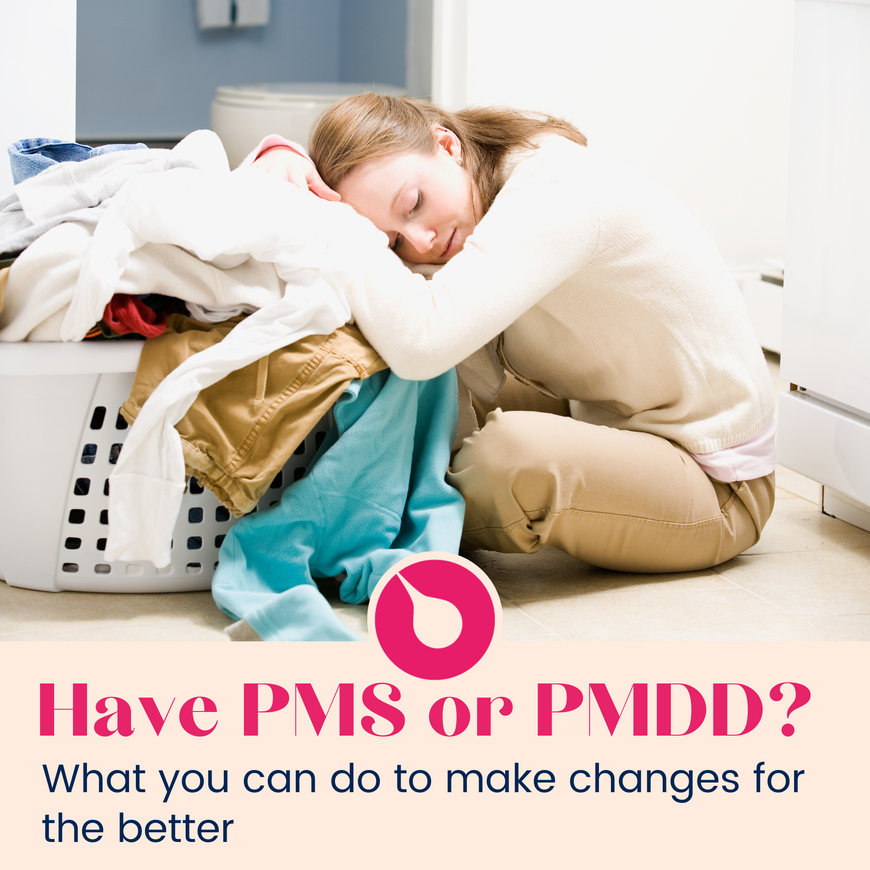For many of us, the days leading up to our periods are the most difficult time in our cycle. Our hormones are in transition, with both estrogen and progesterone dropping off pretty steeply after having been stable for a couple of weeks. It’s a lot for our bodies to handle, so it’s no wonder some of us experience signs menstruation is on its way.
Premenstrual Syndrome
Also known as PMS, Premenstrual Syndrome is common and can include a range of mild to moderate symptoms. These symptoms usually start a few days before menses and can include
- Mood swings
- Irritability
- Tender breasts
- Bloating
- Cramps
- Headaches
- Forgetfulness
- Trouble concentrating
- Feeling overwhelmed
- Decreased energy
The good news is - symptoms only last a few days and resolve during menstruation.
Most people have at least some of these symptoms and while they might slow us down a bit, they shouldn’t really keep us from tending to our daily tasks. In fact, if these (or other) symptoms are severe enough you have to miss school or work, or can’t get out of bed, you might be suffering from PMDD.
Premenstrual Dysphoric Disorder
Premenstrual Dysphoric Disorder, or PMDD, is estimated to affect 3-8% of the population. It is a medically recognized disorder (as of 2013). People who have PMDD might experience
- Severe and debilitating physical and/or emotional symptoms (especially depression or anxiety)
- Panic attacks
- Trouble focusing
- Low energy
- Binge eating
- Feeling out of control
- Lasting irritability or anger
Additionally, an estimated 15% of people with PMDD have attempted suicide. These symptoms may last 1-2 weeks before menstruation, with symptoms lessening or ceasing during menses. If you are suffering from these symptoms, it’s crucial you meet with a medical care provider. You don’t have to live this way and it’s important you get the help you need.
How can we prevent these symptoms?
- Diet. An anti-inflammatory diet will decrease the amount of histamine our body makes, which can decrease period pain. Try steering clear of sugar, alcohol, caffeine, and gluten during the week or so before your period.
- Hormone balance. Higher estrogen can cause stronger cramps and a heavier flow, as well as less stable blood sugar (which can lead to all kinds of cravings and mood swings!). If you are charting your cycles, you can learn whether your estrogen and progesterone are in balance. Check out the Tempdrop Community or check in with an instructor if you need help interpreting your charts.
- Check your exposures. If your hormones are out of balance, it may be due to exposure to environmental substances able to alter our hormones (called endocrine disruptors or xenoestrogens). These chemicals are present in most cosmetics, house cleaning products, perfumes, personal care products, pesticides, and other household products. A few things you can do to support your body in detoxing these endocrine disruptors: stay hydrated, support your liver, sweat, get enough sleep, and have a solid stress-management plan. Also check out Tempdrop’s blog about reducing endocrine disruptors.
- Supplement! Scientists disagree about the exact percentage, but many people in the US are magnesium deficient. Low magnesium levels can be responsible for cyclical headaches, breast pain, and cramps. Calcium has also been found to help relieve menstrual pain. Additionally, Vitamin B6 is known to have a role in creating mood-regulating neurotransmitters. This might mean it can help mediate the emotional symptoms of PMS.
- Use your plant allies!. A few plants to learn about: Ashwaghanda, Evening Primrose Oil, Milk Thistle, Dandelion, Vitex, CBD, St. John’s Wort, Red Raspberry Leaf, and Ginkgo. Plant medicine is complicated, and it’s recommended you find an experienced herbalist to assist. Cera Merrick and Kaeleigh Terrill are both herbalists as well as FAM educators.
- Medical intervention. If your symptoms are severe, you should work with a health care practitioner to make a plan. They may suggest using DAO or progesterone therapy. Progesterone up-regulates the DAO enzyme which clears histamine. Histamine is in part what is causing those symptoms. They may also suggest a Selective Serotonin Reuptake Inhibior (SSRI). 75% of people who tried them reported SSRI’s provided at least some relief.
Remember to Listen!
Our bodies speak to us through signs. Symptoms of any kind are signs something is in need of tending. If you are having PMS or PMDD symptoms, it is a sign something in your body or cycle needs tending. Make sure you are well-fed, hydrated, well-nurtured, and aware of your emotional health. Try and listen to what your body is trying to tell you. Look at the other “pain points” in your body and on your charts. What is your body trying to say?

